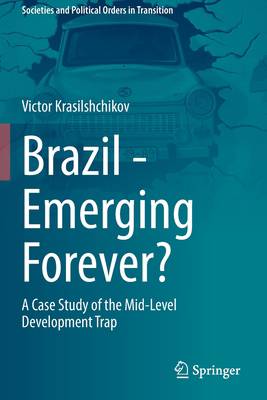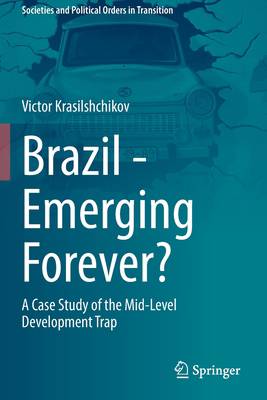
- Afhalen na 1 uur in een winkel met voorraad
- Gratis thuislevering in België vanaf € 30
- Ruim aanbod met 7 miljoen producten
- Afhalen na 1 uur in een winkel met voorraad
- Gratis thuislevering in België vanaf € 30
- Ruim aanbod met 7 miljoen producten
Zoeken
€ 105,45
+ 210 punten
Uitvoering
Omschrijving
This book discusses the social and economic problems currently faced by Brazil as one of the largest "emerging countries". It examines the prospects of Brazilian development from an interdisciplinary perspective, and studies both socio-economic and political variables.
The book embraces the large period of Brazil's development in the 20th and the first decades of the 21st Century. The peculiar attention is drawn to the short period of prosperity under the left-centrist governments as a continuation of the previous conservative modernisation model, which produced an increased dependency on China and a premature deindustrialisation of the economy. Assessing Brazilian statistics on households' incomes and consumption, the book subsequently discusses the lack of strong social actors as the main problem in today's Brazil. In closing, it examines probable scenarios for the country's development and compares the situation to other "emerging countries", including the Asian giants, China and India.
The book addresses the needs of researchers in the fields of political science, economics and sociology who are seeking a better understanding of emerging countries, and the Brazilian case in particular.
The book embraces the large period of Brazil's development in the 20th and the first decades of the 21st Century. The peculiar attention is drawn to the short period of prosperity under the left-centrist governments as a continuation of the previous conservative modernisation model, which produced an increased dependency on China and a premature deindustrialisation of the economy. Assessing Brazilian statistics on households' incomes and consumption, the book subsequently discusses the lack of strong social actors as the main problem in today's Brazil. In closing, it examines probable scenarios for the country's development and compares the situation to other "emerging countries", including the Asian giants, China and India.
The book addresses the needs of researchers in the fields of political science, economics and sociology who are seeking a better understanding of emerging countries, and the Brazilian case in particular.
Specificaties
Betrokkenen
- Auteur(s):
- Uitgeverij:
Inhoud
- Aantal bladzijden:
- 198
- Taal:
- Engels
- Reeks:
Eigenschappen
- Productcode (EAN):
- 9783030502102
- Verschijningsdatum:
- 6/11/2022
- Uitvoering:
- Paperback
- Formaat:
- Trade paperback (VS)
- Afmetingen:
- 156 mm x 234 mm
- Gewicht:
- 308 g

Alleen bij Standaard Boekhandel
+ 210 punten op je klantenkaart van Standaard Boekhandel
Beoordelingen
We publiceren alleen reviews die voldoen aan de voorwaarden voor reviews. Bekijk onze voorwaarden voor reviews.











